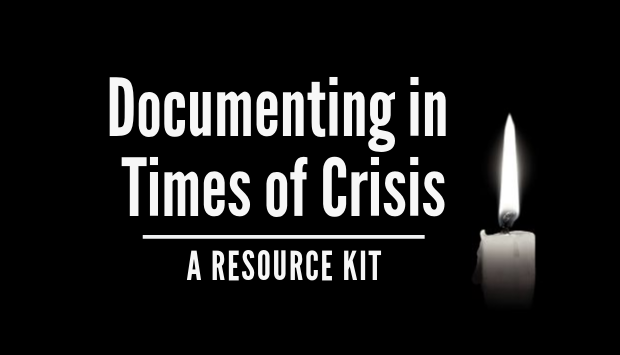- About Archives
- About SAA
- Careers
- Education
- Publications
- Advocacy
- Membership

The recurrence of both human-made tragedies and disasters of weather combined with the great speed of technological development lead archivists to a new role in society—as stewards of contemporary information. To assist cultural heritage responders, this resource kit provides templates and documents that will assist archivists in collecting materials on tragedies within their communities. We hope that sharing the documents collated in the toolkit will help archivists and others responsible for archiving the aftermath of tragic events by providing templates that are ready for use without further burdening cultural heritage responders.
The documents are designed to be a starting point and are meant to be customized for local use in consultation with communities, administrators, and legal counsel as necessary. The templates and documents are divided into broad categories linked below, or see the complete Google Drive folder here.
Crisis Collecting Assistance Team
The SAA Crisis Collecting Assistance Team (CCAT) offers remote assistance with identifying best practices or logistics for documentation, referrals to appropriate allied organizations, and general guidance on crisis collecting. CCAT volunteers include expert archivists who have all faced similar situations in leading and supporting their staff through processing and documenting tragedies great and small. To connect, send a message via this online form, and a member will respond by phone or email within 72 business hours.
Contact the Crisis, Disaster, and Tragedy Response Working Group (at saahq@archivists.org) with notes on broken links or suggestions for additional resources.
Immediate ResponseThe following templates are designed for aiding in the collection and gathering of material. Although some of the files are volunteer focused, they contain useful information and strategies for acquiring material. Before you begin collecting, we highly recommend questioning whether or not collection response is appropriate. More information regarding decision making processes regarding collecting and policies can be found in the “Administrative Policies and Agreements” section. |
Contact Tracking |
Inventory Guidelines |
Inventory Template |
Tragedy Response Preparedness Checklist |
Volunteer Agreement Form |
Volunteer Checklist |
Volunteer Procedures |
Collection ManagementAfter material is collected, it will require ongoing management for preservation and access purposes. These forms are designed to help with hiring and budgeting for the collection. |
Job Description |
Management Budget |
Processing Budget |
Administrative Policies and AgreementsThese guidelines and policies address additions and changes that may need to be made for the acquisition of tragedy based material. They are intended as guidelines for individuals/organizations starting from scratch or making addendums/editions to existing policies. It can be crucial to document decision making processes to help lessen current and future confusion around decisions made. |
Anonymous Donations Accession Policy |
Appraisal Policy |
Collection Policy Guidelines |
Collection Policy Template |
Deaccessioning Policy |
Deed of Gift Template |
Digital Deed of Gift Addendum |
Memorandum of Understanding |
Organic Material Policy |
Use Agreement for Digital Content |
Digital Content |
Digital Submissions Terms and Conditions |
Digitization Guidelines Bibliography |
Documenting the Now |
Guidelines for Twitter Captures |
Web Content Crawling/Archiving Permission Form |
Web Content Crawling/Archiving Permissions Templates |
Website Archiving Nomination Form |
Emotional SupportResources and ethical considerations when working with trauma-based collections. |
Australian Society of Archivists course “A Trauma-Informed Approach to Managing
Archives”
|
Grief, Trauma, and Self Care Resources |
New Zealand Psychological Society, Emergencies and Traumatic Events Resources |
UK & Ireland Archives & Records Association Emotional Support Guides
|
Oral HistoriesYour community may want to preserve the cultural impact of the event through oral histories. The following documents ensure that the oral histories can be preserved and shared. |
Creative Commons Permission Form |
Release Form |
Web Guides to Doing Oral History |
Copyright and Licensing Agreement |
Manuals and ResourcesMany other individuals and organizations have created toolkits, guidelines, and documentation related to responding to tragic events. Although not all of these resources are specific to archives, they may be of help. |
“Psychosocial Guidelines for Temporary Memorial Management” |
“Bibliography of Disaster/Tragedy Literature as Related to Archives” |
“Resources for Archiving the Aftermath” |
Approved by the SAA Council, August 2019. Last updated: September 5, 2019; February 2023.